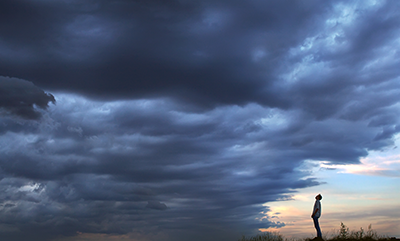Focus Needed on Social Connections After Disasters.
 In the aftermath of natural disasters, social support is considered one of the most important protective factors against post-traumatic stress (PTSD).
In the aftermath of natural disasters, social support is considered one of the most important protective factors against post-traumatic stress (PTSD).
A new study, co-authored by a School of Public Health researcher, found that lower emotional support was associated with higher PTSD in two ways: People who had less support in the early aftermath of a disaster tended to have higher PTSD, and those who had higher levels of PTSD were more likely to report low levels of emotional support—a relationship the authors called “bidirectional.”
The study, published online in the Journal of Traumatic Stress, was based on interviews with more than 600 residents of two counties in Texas that were affected by Hurricane Ike in 2008. Participants were interviewed three times over 19 months to gauge their PTSD symptoms and levels of three kinds of support: emotional, informational (advice and suggestions), and tangible (money, housing, etc.).
The authors found that emotional support was the most common type of support reported, and that while it increased in the first nine months, it declined afterwards. The study suggests that, over time, PTSD could contribute to perceptions that support is unavailable, as people withdraw or lose interest in interpersonal activities.
Interestingly, residents who reported greater levels of informational support also reported higher rates of PTSD, suggesting that the provision of advice and information does not protect against long-term symptoms.
“Our results were consistent with recommendations for mental health service providers in the aftermath of a disaster that include ‘participating in a support group’ and ‘talking to another person for support’ to restore supportive connections and minimize the psychiatric consequences of disaster through social causation processes,” the authors said. “Priority should be placed on targeting individuals with evidence of distress for the restoration of normal social functioning and the improvement of psychiatric health.”
Sandro Galea, dean and Robert A. Knox Professor, was a co-author on the study, which was supported by the National Institutes of Mental Health. Other authors were from Columbia University’s Mailman School of Public Health (Jonathan Platt, lead author), Montclair State University, Dartmouth Medical School, and the Harvard T.H. Chan School of Public Health.